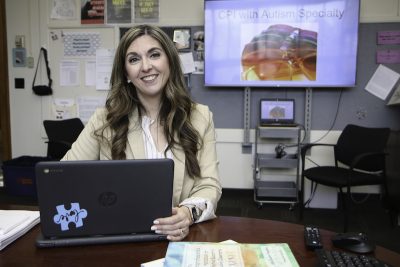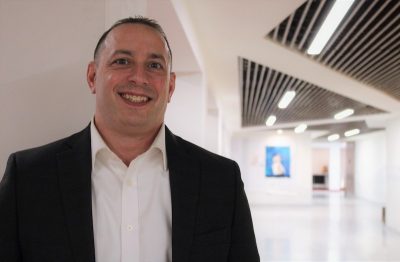Leela George, a professor in Syracuse University School of Education’s Teaching and Leadership program, says moving The Study Council sessions online has created greater flexibility for its members, bringing together public school colleagues from across Central New York for what several participants say are “robust conversations” on school leadership.

The Study Council—in existence for more than 50 years—is comprised of educational leaders from Central New York school districts and BOCES. They collaborate through monthly Zoom sessions, with School of Education faculty serving as facilitators to help bridge educational theory to school and classroom practice.
Interesting Shift
“Going virtual really opened The Study Council up,” says George, noting last year’s online session, a regional book study, saw 21 districts participate. “We’ve had a lot of membership before, but often people couldn’t commit to a two-hour, in-person session.”
Membership now spans from Watertown in the north of the region to Cortland County in the south.
“It’s a vast range of schools,” says triple SOE alumna Meghan Thomas ’03, G’05, G’15. “Members have a variety of backgrounds, expertise, and life experiences, and everyone has really great ideas and thoughts.”
Thomas, who works as Associate Director for Special Education at East Syracuse-Minoa Central School District, has participated with The Study Council for the past three years. “This year is an interesting shift,” she says. “It’s an opportunity for collaboration and discussion around current issues that we are all facing in our districts.”
For the 2022-2023 sessions, Professor George Theoharis has been facilitating Community of Practice sessions with a focus on ways districts can advance policies. “I appreciate his professionalism, his insight, and his research into how we can work to build better schools and better educational communities,” Thomas says of Theoharis efforts.
Really Valuable
“It is very helpful to hear both the experiences districts are having and to hold dialogue. The inter-district work has been really valuable.”
—Peter Reyes
Community of Practice sessions serve as a follow-up to the 2021-2022 book study in which participants unpacked the disruptive leadership practices outlined in Theoharis’ book, Five Practices for Equity-Focused School Leadership (ASCD, 2021).
Jamesville-DeWitt Central School District’s Assistant Superintendent for Educational Services Peter Reyes says the book study provided a good knowledge base for districts to build on this year as they look to increase educational equity and address issues that may marginalize members of a broad learning community.
“The book study was a good partnership,” he says. “And this year, it is very helpful to hear both the experiences districts are having and to hold dialogue. The inter-district work has been really valuable.”
The Community of Practice is designed to support leadership teams that are continuing the difficult, ongoing work of equity-focused school leadership. One requirement of The Study Council is for districts to participate as full leadership teams and commit to attending together. Discussions center around the culture and climate of each district and for all their stakeholders. Members share strengths, initiatives, problems, and questions for the entire Community of Practice to engage with and learn from.
“Every district is signed up for two presentations,” Thomas notes. One presentation looks at an educational equity project that a district is taking on. The second is an opportunity to pose a question or challenge to the group and then get feedback from colleagues.
Two-Way Street

Entire administrative teams from nine districts signed up for the Community of Practice, including Baldwinsville, Cato-Meridian, Jordan-Elbridge, Jamesville-DeWitt, Fayetteville Manlius, East Syracuse-Minoa Central School District, and Watertown.
“It’s really a two-way street,” says George, who has served as The Study Council’s Executive Director for the last six years. A goal, she says, is to hold discussion—not just give presentations.
Thomas says she views the group as a safe space to share challenges, and even at times very sensitives topics, her district faces: “It’s safe for us to ask some really challenging questions.”
Reyes agrees. Challenges in Jamesville-DeWitt, he says, are similar to others’, particularly as districts emerge from the coronavirus pandemic and work to ensure communities that were most impacted are getting back on track. “Those tended to be your most marginalized populations,” he says, referring to COVID-related learning loss and disengagement. “We are addressing those populations, ensuring they are getting resourced appropriately, so there is no inequity in final outcomes.”
Attending sessions and hearing that colleagues are dealing with similar situations, Thomas says, affirms her work. “Talking with them about equity, how we’re navigating instances of racism or bias—there’s a reassurance knowing that it’s not just a school specific or a district specific issue.”
Feedback from a community of educators across the region and academics, Thomas says, is valuable.
“I think the ability to connect with experts in the field, such as professors Theoharis and George, who are working with their colleagues across the country and reviewing the data, is really something special,” Thomas concludes. “I’m very grateful for the partnership between our districts and The Study Council.”
By Ashley Kang ’04, G’11 (a proud alumna of the M.S. in Higher Education program)
Learn more about The Study Council at Syracuse University School of Education or contact Professor George Theoharis.
